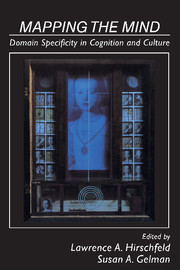Book contents
- Frontmatter
- Contents
- List of contributors
- Preface
- Part I Overview
- Part II The origins of domain knowledge: Biology and evolution
- Part III The origins of domain knowledge: Conceptual approaches
- Part IV Are domains theories?
- Part V Domains across cultures and languages
- Part VI Implications for education
- 18 Teachers' models of children's minds and learning
- 19 Situated rationalism: Biological and social preparation for learning
- Author index
- Subject index
19 - Situated rationalism: Biological and social preparation for learning
Published online by Cambridge University Press: 04 August 2010
- Frontmatter
- Contents
- List of contributors
- Preface
- Part I Overview
- Part II The origins of domain knowledge: Biology and evolution
- Part III The origins of domain knowledge: Conceptual approaches
- Part IV Are domains theories?
- Part V Domains across cultures and languages
- Part VI Implications for education
- 18 Teachers' models of children's minds and learning
- 19 Situated rationalism: Biological and social preparation for learning
- Author index
- Subject index
Summary
The human sciences can be characterized as a working out of two sets of tensions in interpreting human experience: tensions between the biological and the social and between the particular and the general. In this chapter, I examine the relations between two lines of thinking, each commanding increasing attention among psychologists and social scientists, that appear to be contradictory. The first, a position I term conceptual rationalism, seeks biological foundations for specific concepts that are central and, perhaps, universal in human development. The second, a position that has come to be known as situated cognition, argues that knowledge is acquired in and attuned to specific social and historical situations and that conceptual development can be understood only in terms of the situational contexts of action. I argue here that the rationalist and situationist views, far from being contradictory, share important epistemological assumptions and can – perhaps must – be combined to provide a theory of cognitive development and functioning. I develop a view of learning and development that I call situated rationalism, illustrate it with some examples from mathematics and science learning, and consider its implications for education.
The conceptual rationalist argument: Biological preparedness
In recent years, there has been a reassertion of interest in the biological basis of human learning and thinking (e.g., Gelman & Carey, 1991; many chapters in the present volume). This new line of thinking grows out of recent research on language development, concept development in infancy and early childhood, and animal cognition and learning. The core proposal of those pursuing this line of thinking is that there exists a set of biological constraints on learning and cognitive development.
- Type
- Chapter
- Information
- Mapping the MindDomain Specificity in Cognition and Culture, pp. 474 - 494Publisher: Cambridge University PressPrint publication year: 1994
- 52
- Cited by



